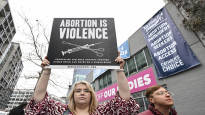In Alabama, USA, the future of fertilization treatments may be threatened after the state’s highest court ruled that even an embryo outside the womb and frozen is a human being, reports the US media.
The court took a stand on the matter when three couples who received fertilization treatments filed a lawsuit after their own embryos were accidentally destroyed. In 2020, a patient at a clinic had gone to the embryo storage facility and accidentally dropped embryos on the ground.
The Supreme Court announcedthat embryos are children regardless of their whereabouts, and returned the case to a lower court.
After the decision, the largest fertilization chain in Alabama, operating in connection with the University of Birmingham, announced that it will temporarily stop fertilizing eggs for fear of lawsuits.
Now many fear that in vitro fertilization is threatened in Alabama. The decision may have wider consequences, as states often follow each other’s legislation.
The system for those suffering from infertility considers the decision cruel
The question of when an embryo or fetus can be considered a human being with rights has gained momentum in the United States after the federal Supreme Court ruled that the right to abortion cannot be regulated at the federal level. Each state decides about it itself.
Since then, 21 out of 50 states have either banned abortion or restricted the right from before, says The New York Times magazine. Abortions are almost completely prohibited in Alabama.
Opponents of abortion believe that human life begins at conception. The Alabama Supreme Court’s decision on the humanity of the embryo is based on the state’s abortion law.
A University of Alabama fertility clinic now fears lawsuits if it continues to freeze embryos.
– We have to evaluate the possibility that our patients and doctors could face criminal charges or pay damages for participating in in vitro fertilization, university spokesperson says Al.com, the state’s largest online news site.
The National Infertility Association, an organization that helps those suffering from infertility, calls the court decision cruel.
The CEO of the organization Barbara Collura according to that and the decision of the university clinic that followed it are terrifying signs of what can happen throughout the country.
The New York Times estimates that Alabama’s decision may lead to different states tightening the rules on fertility treatments, for example by limiting how many embryos can be created in treatments at one time.
The decision also raises the question of what should be done with the millions of frozen eggs.
In in vitro fertilization, the normal practice is that the woman receives hormones to increase egg production. The doctor collects as many eggs as he can and fertilizes them in the laboratory. The goal is to recover as many viable embryos as possible.
However, only one embryo is implanted in a woman’s uterus at a time. Since its development into embryos is not guaranteed, the rest of the embryos are stored for new companies.
If the law is interpreted to prevent embryo freezing in Alabama, if the attempt fails, the entire treatment process must be redone instead of implanting a stored embryo. This increases costs and causes difficulties, especially for those with lower incomes, says the reproductive medicine organization American Society for Reproductive Medicine to The New York Times.
The law also raises the question of whether unused embryos can be donated or destroyed.
The head of the organization Paula Amaton according to both science and common sense, the fertilized egg in the clinic’s refrigerator is not legally the same as a child or a fetus in the womb.
He points out that even in nature, several eggs are often fertilized before one successfully attaches to the uterus and leads to pregnancy.
Opponents of abortion celebrate a victory for life
Opponents of abortion have been delighted by the decision.
The conservative Christian organization The Alliance Defending Freedom calls the decision a huge victory for life.
– Regardless of the circumstances, all human life is valuable from the moment of conception, says the spokesperson of the organization to the British public broadcasting company BBC.
Republican presidential candidate Nikki Haley also considers that embryos are babies. In his opinion, it is different to store sperm or eggs than fertilized embryos.
Haley herself has had a child artificial insemination with help, but he emphasizes that it is different from in vitro fertilization, the news channel CNN says.
Instead, the White House has overruled Alabama’s decision. Spokesman Karine Jean-Pierre say it will cause exactly the kind of chaos they expected when the Supreme Court overturned federal abortion rights and opened the way for politicians to dictate the most personal decisions of families, The New York Times reports.
General infertility treatment
About two percent of US children are born through in vitro fertilization, says the director of the Columbia University Fertility Center Zev Williams news channel for CNN.
The world’s first test-tube fertilized child was born in 1978. Now about eight million of them have been born.
An estimated one in six Americans struggles with infertility, The National Infertility Association says.
In Finland, about five percent of children are conceived through in vitro fertilization.
